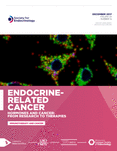Germline mutation contribution to chromosomal instability
- 1Division of Medical Oncology, Cancer Genetics Service, National Cancer Centre Singapore, Singapore
- 2Oncology Academic Clinical Program, Duke-NUS Medical School Singapore, Singapore
- Correspondence should be addressed to J Ngeow; Email: Joanne.Ngeow.Y.Y{at}singhealth.com.sg
Abstract
Genomic instability is a feature of cancer that fuels oncogenesis through increased frequency of genetic disruption, leading to loss of genomic integrity and promoting clonal evolution as well as tumor transformation. A form of genomic instability prevalent across cancer types is chromosomal instability, which involves karyotypic changes including chromosome copy number alterations as well as gross structural abnormalities such as transversions and translocations. Defects in cellular mechanisms that are in place to govern fidelity of chromosomal segregation, DNA repair and ultimately genomic integrity are known to contribute to chromosomal instability. In this review, we discuss the association of germline mutations in these pathways with chromosomal instability in the background of related cancer predisposition syndromes. We will also reflect on the impact of genetic predisposition to clinical management of patients and how we can exploit this vulnerability to promote catastrophic genomic instability as a therapeutic strategy.
- Received 7 April 2017
- Accepted 18 May 2017
- © 2017 Society for Endocrinology












